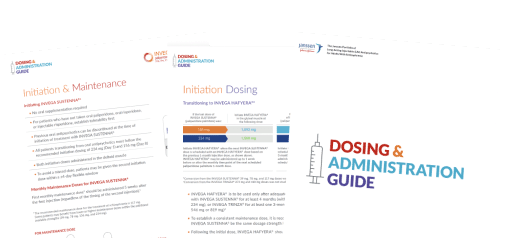FOR US HEALTHCARE PROFESSIONALS ONLY
Dose adjustments and use in special populations1
Renal impairment
INVEGA TRINZA® has not been studied in patients with renal impairment.1
Mild renal impairment (creatinine clearance ≥50 mL/min to <80 mL/min*)1
- For patients with mild renal impairment, adjust dosage and stabilize the patient using the 1-month paliperidone palmitate extended-release injectable suspension, then transition to INVEGA TRINZA®. Refer to the Prescribing Information of the 1-month paliperidone palmitate extended-release injectable suspension product for the recommended dosage
Moderate or severe renal impairment (creatinine clearance <50 mL/min*)1
- INVEGA TRINZA® is not recommended in patients with moderate or severe renal impairment
*Cockcroft-Gault formula.
Pregnancy
- Neonates exposed to antipsychotic drugs during the third trimester of pregnancy are at risk for extrapyramidal and/or withdrawal symptoms following delivery1
- There are no available data on INVEGA TRINZA® use in pregnant women to inform any drug-associated risks for birth defects or miscarriages1
- Paliperidone has been detected in plasma at very low levels up to 18 months after a single-dose administration of INVEGA TRINZA®, and the clinical significance of INVEGA TRINZA® administered before pregnancy or anytime during pregnancy is not known1
- Advise pregnant women of the potential risks to a fetus. The background risks of major birth defects and miscarriages for the indicated population are unknown. In the US general population, the estimated background risks of major birth defects and miscarriages in clinically recognized pregnancies are 2% to 4% and 15% to 20%, respectively1
- Pregnancy Exposure Registry—There is a pregnancy exposure registry that monitors pregnancy outcomes in women exposed to atypical antipsychotics, including INVEGA TRINZA®, during pregnancy. Healthcare providers are encouraged to register patients by contacting the National Pregnancy Registry for Atypical Antipsychotics at 1-866-961-2388 or online at http://womensmentalhealth.org/clinical-and-research-programs/pregnancyregistry/
.
Nursing
- Paliperidone is present in human breast milk; however, there are insufficient data to assess the amount in human milk, the effects in the breastfed infant, or the effects on milk production1
- Paliperidone has been detected in plasma at very low levels up to 18 months after a single-dose administration of INVEGA TRINZA®, and the clinical significance in the breastfed infant is not known1
Reference: 1. INVEGA TRINZA® [Prescribing Information]. Titusville, NJ: Janssen Pharmaceuticals, Inc.
Back to Top
